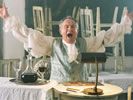Eye For Film >> Movies >> Lunacy (2005) Film Review
"Ladies and gentlemen, what you are about to see is a horror film, with all the degeneracy peculiar to that genre."
In case we are not aware that we are watching a film by Jan Svankmajer (Alice, Faust, Conspirators Of Pleasure, Little Otik), his fifth feature opens with sound of a film-reel running, and with the sight of the filmmaker himself addressing the camera. In a formal, if playful, prologue, Svankmajer states his chosen genre (horror), the sources of his inspiration (Edgar Allan Poe and the Marquis de Sade), and his principal theme ("an ideological debate about how to run a lunatic asylum") - and those unfamiliar with the Czech surrealist's love of stop-motion grotesquery are offered something of a foretaste when his introduction is interrupted by a large, disembodied tongue slithering across the studio floor.

Indeed, like many horror films, Lunacy features blood and guts aplenty - although chiefly in the form of animated tongues, eyeballs and slabs of meat whose choreographed movements comment, like a carnal chorus, upon the live-action scenes that they regularly punctuate. The real horror to be found here, though, is of a more politico-philosophical kind, as Svankmajer allegorises the self-sustaining dialectic between liberalism and tyranny, and the torments, both physical and mental, that these create for humankind in a paradoxical age where everything is at once over-eroticised and emasculated.
Jean Berlot (Pavel Liska) is a decent, naïve young man plagued by a recurring nightmare in which two orderlies attempt to put him in a straitjacket. As Jean travels home from the funeral of his institutionalised mother, a jovial Marquis (Jan Tríska) offers him hospitality in an isolated chateau. That night, in the chapel, Jean will witness the Marquis, his tongueless servant Dominic (Pavel Novy) and two other men engaged in a blasphemous orgy with four women - one of whom, Charlotte (Anna Geislerová), seems a far from willing participant.
Disgusted, Jean tries to leave the following morning, but instead finds himself drawn into another of the libertine Marquis' strange rituals. Then, promised 'preventive therapy' for his aversion to asylums, Jean is persuaded to visit a sanatorium that is run by the Marquis' friend Dr Murlloppe (Jaroslav Dusek). There, Jean recognises the director as one of the participants in the Marquis' orgy, and the director's 'daughter' as none other than Charlotte. She informs Jean that Murlloppe and the Marquis are impostors, and that she is now a prisoner, along with the real director Dr Coulmiere (Martin Huba) and the rest of the staff, who are all locked in the basement. Fast falling in love with Charlotte, Jean agrees to help her rescue her colleagues - but when the inmates have taken over the asylum, it is not so easy to tell who is mad and who sane.
Though the story appears to meander about whimsically, with the promised lunatic asylum not even putting in an appearance until the film's second hour, there is certainly coherence to Svankmajer's vision and method in his madness. For in the end it matters little whether one is outside the asylum or within its wailing walls, since Svankmajer makes the whole world a madhouse and all humanity its patients. Here everyone is in thrall to their most aberrant fears and desires, and here chaotic freedom and ordered control are caught in an eternal struggle that never allows either to be wholly repressed by the other.
Dr Coulmiere tries to put an end to the Marquis' priapic drives by performing on him the mysterious surgical treatment 'Number 13' - but shortly thereafter, a scene between Coulmiere and Charlotte suggests both that Coulmiere, now back in charge, may himself once have been a victim of the treatment, and that even such radical surgery never really succeeds in removing desire.
Indeed it would seem that Coulmiere and the Marquis, for all the divergence of their professed philosophies, are very much cut from the same flesh. Missing parts can be restored or replaced, and even if we end up sliced, dressed and packaged like so much processed meat, it is just food for the libidinous appetites of others being fattened for the slaughter, in a chicken-and-egg cycle that never comes to a close – certainly not with something as paltry as death. The anachronistic details (a minibus, a motorbike, a supermarket) that occasionally puncture the film's otherwise consistent setting in 19th century France serve only to underscore this idea of endless, timeless repetition. Lunacy is not just about its cast of sadomasochistic freaks from a bygone era – it is about us, here and now, in the marketplace of despotism and desire.
By turns absurdly funny, disturbingly dissolute, unnervingly claustrophobic, and caustically misanthropic, Lunacy offers viewers the sort of punishing pleasures that so many of its characters seem, in their different ways, to seek. Perhaps it is not to everyone's tastes, but if your idea of exotic fun can accommodate the sight of two animatronic cows' tongues rutting away with sinewy abandon, then you would be mad to miss Lunacy. And the sound of the Marquis' frenzied cackling, coupled with the film's final, devastatingly simple image, will haunt the corridors of your mind long after the credits have stopped rolling.
Reviewed on: 31 May 2007


















